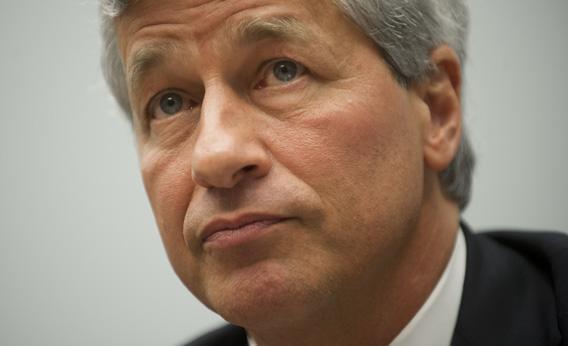It’s been a bad week for JPMorgan Chase Chairman and CEO Jamie Dimon. On May 5, Institutional Shareholder Services urged the company’s stockholders to reject three candidates for the company’s board, ratcheting up an earlier demand that Dimon divide the jobs of chairman and CEO. On Tuesday, a competing advisory firm, Glass Lewis & Co., went even further than ISS by urging rejection of a majority of management’s proposed board members. Advisory firms made noise about the board a year ago, but this time may be different. Black Rock, Vanguard, and Fidelity Investments all supported Dimon in 2012, but the Wall Street Journal reported Monday that those firms are pointedly undecided in advance of voting that will begin on May 21.
If Dimon’s candidates lose the election, he would likely lose one (or possibly even both of his jobs). It will have been a remarkably swift fall for an executive who was recently the toast of the American elite. Even if he wins, the struggle has been a huge blow to Dimon’s reputation. Either way, we will see that the formal tools of corporate governance are laughably inadequate to the task of disciplining a gigantic financial institution.
Back before the financial crisis of 2008, people liked to suck up to the CEOs of major banks. These are very rich men, after all, and they deal in matters that seem simultaneously more arcane and more sophisticated than oil extraction, consumer products, or retailing. But then came a major collapse that suggested many of them were immoral, dangerously incompetent, or both. Enter Dimon. Under his leadership, JPMorgan actually pioneered many of the financial instruments that led to so much mischief. In her excellent account of the era, Fool’s Gold: The Inside Story of J.P. Morgan and How Wall St. Greed Corrupted Its Bold Dream and Created a Financial Catastrophe, Gillian Tett reveals that their BISTRO product, officially “broad index secured trust offering,” was such a clever way of exploiting regulatory loopholes “that some bankers started to joke that ‘BISTRO’ really stood for ‘BIS Total Rip Off.’” But Morgan understood these products better than most competitors and didn’t go as crazy during the boom as its imitators, and Dimon reduced the company’s exposure before the market collapsed.
Consequently, JPMorgan Chase emerged from the crisis stronger than its peers, and Dimon was the toast of both Wall Street and Washington.
Then came the London Whale. Bruno Iksil, a trader at the bank’s chief investment office in London, lost billions of dollars on a terrible bet. That was bad. Even worse is that he did it while ostensibly trying to “hedge” risk rather than speculate profitably. Conveniently, such risk-hedging trades are supposed to be exempted from Volcker Rule prohibitions on big banks speculating with their clients’ money. The scale of the losses revealed that banks were ready and willing to drive trucks full of money through the loophole.
That took the sheen of Dimon, and now regulators are swarming. By March, eight separate agencies were looking into different aspects of JPMorgan. Last week, the Federal Energy Regulatory Commission got into the game, recommending sanctions against the bank for “manipulative schemes” that turned “money-losing power plants into powerful profit centers.”
It’s easy to see how these troubles have weakened Dimon’s standing in the eyes of shareholders and advisory firms. What’s less clear is how cutting Dimon’s role in the company would actually solve anything. Lots of companies separate the chairman and CEO role or have more independent directors. The fact is that the CEO is still the one calling all the shots. A board spot is a plum position—a highly compensated part-time job in which all your incentives are to not rock the boat. The real way corporate governance works in America is that if your share price falls too much, you might be taken over by some corporate raider who buys up such a large swath of the company that he has real influence. Alternatively, if your business does too poorly, you might just end up in bankruptcy.
And this is the whole problem with big banks. Regulators worry that putting them through a liquidation process risks economy-wide panics and bank runs. When small banks fail, the FDIC normally handles it through the takeover process: The small bank gets merged with a larger institution. But this doesn’t work for supergiants: They’re too big to merge. That leaves us with the need for prophylactic regulation to avoid excessive risk-taking. The Dodd-Frank financial reform bill contains lots of useful measures to do that, but implementation has been badly delayed and bank lobbyists are having a lot of success at poking holes in it as rules are finalized.
Even as the industry and the Obama administration fight over these details, one thing they can agree on is that they’d like to consider the entire issue of “too big to fail” as having been put to rest. But Dimon’s woes are a reminder that we still don’t have the biggest banks under control. CEOs don’t know what their traders are doing, boards can’t supervise CEOs effectively, and regulators are busy tracking down failures after the fact. The more JPMorgan’s various stakeholders fight over governance, the more people are going to look again at measures like the Brown-Vitter that aim to simply shrink these firms to a more manageable size. The speed with which Dimon’s reputation has turned emphasizes the extent to which this is a business where it’s very hard to separate luck from skill, and even savvy firms are prone to massive unexpected stumbles. The next megabank failure may not come this year or next, but it’ll happen one of these days and the system’s still not ready for it.
